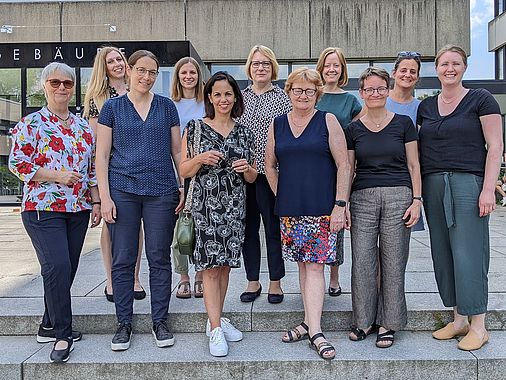Hidden Patterns - Abuse and Cover-Up
The Gendered Power System in the Catholic Church and its Impact on Women in Religious Communities – A trans-disciplinary and international DFG workshop at the University of Regensburg
29 June 2023
Gender-specific factors in the power system of the Catholic Church: The impact of these factors, especially on women religious and female members of religious communities, was the topic of a recent transdisciplinary DFG workshop at the University of Regensburg, organized by the team of the Chair of Pastoral Theology and Homiletics around Professor Dr. Ute Leimgruber together with Professor Dr. Hildegund Keul, head of the DFG project "Vulnerabilities" at the Julius Maximilian University of Würzburg.
One conclusion of the international expert meeting from June 8 to 10 at the University of Regensburg: Hidden patterns, which run through the abuse and cover-up of abuse of adult women, are an international phenomenon. Therefore, the patterns need to be described, addressed and ultimately changed in international collaborations.

Participants of the workshop "The Gendered Power System in the Catholic Church and its Impact on Women in Religious Communities" at the University of Regensburg. Credit: Charlotte von Schelling/UR
Catholic Church: The Power of Men
Professor Dr. Kathleen McPhillips from the University of Newcastle (Australia) opened the workshop with her presentation on specific mechanisms of gender-based violence in the context of the Catholic Church. In the context of the question of the emergence of gendered forms of violence, McPhillips described the Catholic Church as an organization in which an extreme abundance of power is concentrated in the hands of very few, exclusively male members of that organization. McPhillips emphasized, "Violence was and is inevitable in this system."
The scholar illustrated this with the example of the specific contextual conditions within which female religious in 20th century Australia became both victims and perpetrators of physical, emotional, and sexual abuse. The extreme dependence of women religious on the local bishop significantly limited their agency in exposing abuse even they possessed great power in other areas - for example, because of their position as principals or religious superiors.
Empowerment and the Ability to Act
Professor Dr. Katharina Karl from the Catholic University of Eichstätt-Ingolstadt spoke about the conditions of empowerment and agency using the example of young women in Buenos Aires. According to Karl, in the biographical interviews conducted with the young women, central experiences of vulnerability and empowerment could be identified. They included homelessness, domestic violence and the experience of racism on the one hand, and the inner freedom to say no, the freedom of choice with regard to one's own career, and social support on the other.
Karl emphasized that the experience of empowerment can be differentiated into internal and external factors. It is important to note that external factors such as a positive experience of community, the experience of self-efficacy, social support and recognition are highly dependent on the prevailing systems of power and therefore lie in the systemic responsibility of all those with power within the system.
Representations and Perceptions of Abuse
Dr. Doris Reisinger from the Goethe University Frankfurt a. M. concluded the first workshop day with her lecture on the representation and perception of sexual abuse of women religious. She stressed the simultaneity of both the visibility and the invisibility of the topic. While church-historical research, theology and the abuse studies conducted by the German dioceses hardly pay any attention to the topic, the sexual abuse of women religious is certainly addressed in (erotic) literature, the tabloid press, but also in court proceedings and testimonies of those affected.
Reisinger offered several examples of how the options of affected women religious to tell the story of their abuse were and are restricted in many ways. On the one hand they are restricted by the power of clerics over women religious and their interest in maintaining an ideal image of female monastic life. On the other hand, they are restricted by the utilization of the sexual abuse of women religious as a means of entertainment, the satisfaction of voyeuristic interest, or by framing it as a tool of anti-Catholic propaganda. Reisinger emphasized, "Third-party interest in reports of abuse against women religious has the potential to silence the voices of women religious who disclose their abuse. Researchers and the public should have an urgent interest in getting as close as possible to the original voices of the survivors.
Ambiguity of Perpetrators and Victims
Dr. Tracy McEwan of the University of Newcastle (Australia) presented the case study of the Sisters of Charity, a community of Irish women religious who began building schools, orphanages and hospitals in Australia in 1838. McEwan showed the massive dependencies the women religious found themselves in shortly after their arrival, when the Archbishop of Sydney (successfully) attempted to separate the still small religious community in Australia from the congregation in Ireland. McEwan also illuminated the ambiguity in which women religious found themselves as part of a clericalist system, both as affected by gendered power inequality and as perpetrators.
Abuse of Women Religious
Dr. Rocio Figueroa from Good Shepherd College in Auckland (New Zealand) presented a workshop that had been held in Nairobi in January of 2023. This workshop had been attended by 30 women religious from different religious congregations and different African countries. The goal of the workshop was to address the sexual and spiritual abuse of women religious in Africa. Figueroa reported on the careful planning that was necessary to be able to hold the workshop at all. To enable participants to break the taboo around the topic of sexual abuse, the first part of the workshop focused on how women religious can support and accompany survivors of sexual abuse. Only the second part, with the topic of spiritual abuse, was explicitly focused on the participants as possible victims and survivors of abuse.
Although only five months had passed since the workshop had been held in Nairobi, Figueroa already reported successful attempts to multiplicate the workshop: Because the materials the team had worked with during the workshop were accessible on the Internet without access restrictions, the first women religious have already conducted the workshop in their own communities and raised the issue of spiritual and sexual abuse using the Accompanying Survivors of Sexual Harm toolkit and the Red Flags in Religious Life video series. Figueroa emphasized, "The only potential for change is through the women themselves."
To do: Research on Female Perpetrators
The final speaker of the morning, Dr. Barbara Haslbeck, a research associate at the University of Regensburg, provided valuable insights into her ongoing research project on women religious who were sexually abused as adults and in religious life. She highlighted the extremely poor state of research on female perpetrators to date and spoke of a "gender-specific one-sidedness of previous research on abuse in the (Catholic) Church. So far, women have been neglected both as perpetrators and as survivors."
The afternoon of the second workshop day was opened by Magdalena Hürten, research and teaching assistant at the University of Regensburg. Hürten presented central results of her doctoral project, which is near completion and deals with the conditions of knowledge production in the context of abuse while examining the founding history of the Sisters of St. Francis Vierzehnheiligen. In the initial phase of the community in the 1890s, there were cases of abuse of religious and other adult women by the founder. In her dissertation, Hürten works with Miranda Fricker's concept of epistemic injustice, which shows how gender-specific norms can influence the transmission and formation of knowledge – also of knowledge about sexual abuse. For example, credibility is attributed to witnesses differently depending on their gender (testimonial injustice).
Hiding the Truth
Dr. Regina Heyder, lecturer at the theological-pastoral institute in Mainz, systematized observations from current abuse studies from the perspective of measured bodies. In numerous testimonies of survivors of sexual abuse by clergy, there are descriptions of acts of abuse in which the survivors speak of their bodies being measured and gauged by the perpetrators. In the logic of the perpetrator, the body of the victim can, e.g., be divided by the perpetrator into areas that may not be touched and areas where touching is possible without affecting the victim's chastity and the perpetrator's promise of celibacy.
At the same time through cloaking the act of abuse and interpreting it as an act of God's love, an almost complete eclipse of the perpetrator's body can be observed. Through the framing employed by the perpetrator, their body recedes completely vanishes behind the so-called ‘action of God’, the speaker said.
Johanna Beck, literary scholar and member of the survivors of abuse advisory board of the German Bishops' Conference, gave an insight into her own story of sexual and spiritual abuse within the Catholic Scouts of Europe (KPE) at the end of the second day of the conference. In addition to the systemic factors within the KPE that enabled and facilitated the abuse, Beck also emphasized the significant potential for retraumatization that currently characterizes the work of the survivors in the Catholic Church's survivors of abuse advisory boards.
Categories for Analyzing Patterns
Professor Dr. Hildegund Keul, head of the DFG research project "Vulnerabilities" at the University of Würzburg, opened the third and final day of the workshop with a presentation on vulnerability, resilience and vulnerance as central categories for describing and analyzing those (hidden) patterns that can be identified in the countless documented cases of spiritual and sexual abuse of adult women. Keul noted that the debate about vulnerability in the context of sexual abuse is simplistic and one-sidedly focused to the vulnerability of survivors.
In contrast, the potentially vulnerant (i.e., being prepared to inflict wounds) vulnerability of religious communities, which can be seen, for example, in the cover-up of abuse arising from fear of being vulnerable, is perceived far less. Keul emphasized that abuse cannot be studied solely in the binary concept of vulnerability and resilience. Because sexual and spiritual abuse has complex, ever-changing dynamics, it must be analyzed with a complex model that also considers the vulnerance of individuals and systems.
International Phenomenon
The workshop closed with a reflective session in which important impressions of the past three days were shared, further research questions were developed, and important plans for the future were discussed. Many participants emphasized the high value of international networking for a research area such as sexual and spiritual abuse of women. On the one hand, networking within the research community and with survivors of sexual and spiritual abuse in the sense of mutual empowerment and ethical reflection on one's own research is central.
On the other hand, however, the participants summed up an important conclusion of the workshop: The Hidden Patterns that run through the cases of abuse and the cover-up of abuse against adult women are not limited to Germany, but are an international phenomenon. As such, they must also be described, dealt with, and ultimately changed in international collaborations.
Information/Contact
Hidden Patterns of Abuse - Missbrauchsmuster
DFG-Project Vulnerabilities: A Heterology of Incarnation in Vulnerability Discourse
For press inquiries:
Dr. Judith König, E-Mail: judith.koenig@ur.de




